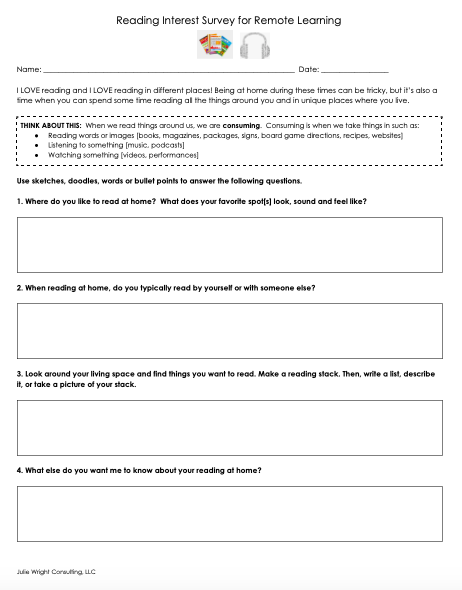At the start of this school year, I blogged about using reading surveys as a go-to source of data for creating a focus for instruction. That blog post can be found here. I talked about the importance of carefully choosing survey questions that would give us just-in-time data that we could use to create a focus for instruction during the first weeks of the school year and beyond.
During this pandemic, surveying students now — in relation to their at-home learning environment and reading interests — would provide intel, or data, that could inform your digitally-focused, remote-learning, instructional moves going forward.
TRY THIS
Give students a copy of the Reading Interest Survey for Remote Learning digitally or on paper depending on your district’s policies and procedures.
Ahead of time, fill out a survey about yourself. To lift students’ thinking across the learning community, share a few ideas from your survey by:
Giving students a copy of your survey to view [hard or soft copy]
Sharing ideas from your survey via a pre-recorded or live video
Note: By sharing your survey, students will have an opportunity to get to know you and your at-home routines while serving as a model for when they complete their surveys.
If students have the capability of sharing and/or communicating with one another, break them into small groups and let them have a conversation [either through voice-to-voice or writing] about noticings and celebrations. You can encourage students to borrow great ideas about reading at home from one another that they might want to put into action.
Save student surveys — they might teach you something later that you didn’t know you wanted/needed to know now.
LOOKING ACROSS THE DATA
As you look across student survey results, here are some ways you might consider using the data to guide your next moves. You could:
Use the data to inform you and help students create a personalized reading spot at home, if needed.
Take stock in what types of texts students put in their stack. This could be a great opportunity to curate texts for students to read. That is, of course, all dependent on what’s available, applicable and doable during this time.
If you are meeting with students virtually, you could:
Celebrate things people have in common
Create a big list of reading recommendations
Use this survey data to create conversation starters or entry points for future instruction
These are tricky times. But, they are less tricky when we make connections and keep connections going. Student surveys are one way to make that happen. If you like this survey, use it! Or, use it as a springboard to create your own. If you come up with some great ideas, please reach out to me at julietwright4444@gmail.com or via my CONTACT PAGE and share ideas!
